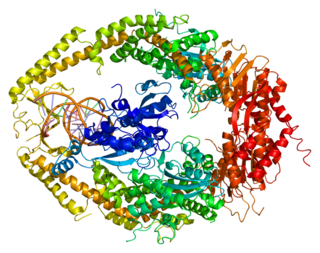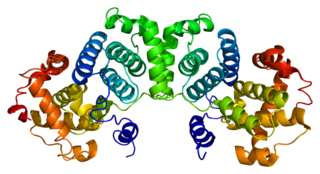Related Research Articles

ATM serine/threonine kinase or Ataxia-telangiectasia mutated, symbol ATM, is a serine/threonine protein kinase that is recruited and activated by DNA double-strand breaks, oxidative stress, topoisomerase cleavage complexes, splicing intermediates, R-loops and in some cases by single-strand DNA breaks. It phosphorylates several key proteins that initiate activation of the DNA damage checkpoint, leading to cell cycle arrest, DNA repair or apoptosis. Several of these targets, including p53, CHK2, BRCA1, NBS1 and H2AX are tumor suppressors.
Carcinogenesis, also called oncogenesis or tumorigenesis, is the formation of a cancer, whereby normal cells are transformed into cancer cells. The process is characterized by changes at the cellular, genetic, and epigenetic levels and abnormal cell division. Cell division is a physiological process that occurs in almost all tissues and under a variety of circumstances. Normally, the balance between proliferation and programmed cell death, in the form of apoptosis, is maintained to ensure the integrity of tissues and organs. According to the prevailing accepted theory of carcinogenesis, the somatic mutation theory, mutations in DNA and epimutations that lead to cancer disrupt these orderly processes by interfering with the programming regulating the processes, upsetting the normal balance between proliferation and cell death. This results in uncontrolled cell division and the evolution of those cells by natural selection in the body. Only certain mutations lead to cancer whereas the majority of mutations do not.

Cyclin B is a member of the cyclin family. Cyclin B is a mitotic cyclin. The amount of cyclin B and the activity of the cyclin B-Cdk complex rise through the cell cycle until mitosis, where they fall abruptly due to degradation of cyclin B. The complex of Cdk and cyclin B is called maturation promoting factor or mitosis promoting factor (MPF).

p16, is a protein that slows cell division by slowing the progression of the cell cycle from the G1 phase to the S phase, thereby acting as a tumor suppressor. It is encoded by the CDKN2A gene. A deletion in this gene can result in insufficient or non-functional p16, accelerating the cell cycle and resulting in many types of cancer.

Survivin, also called baculoviral inhibitor of apoptosis repeat-containing 5 or BIRC5, is a protein that, in humans, is encoded by the BIRC5 gene.

DNA mismatch repair protein Msh2 also known as MutS homolog 2 or MSH2 is a protein that in humans is encoded by the MSH2 gene, which is located on chromosome 2. MSH2 is a tumor suppressor gene and more specifically a caretaker gene that codes for a DNA mismatch repair (MMR) protein, MSH2, which forms a heterodimer with MSH6 to make the human MutSα mismatch repair complex. It also dimerizes with MSH3 to form the MutSβ DNA repair complex. MSH2 is involved in many different forms of DNA repair, including transcription-coupled repair, homologous recombination, and base excision repair.

Ras association domain-containing protein 1 is a protein that in humans is encoded by the RASSF1 gene.

G2/mitotic-specific cyclin-B1 is a protein that in humans is encoded by the CCNB1 gene.

Methylated-DNA--protein-cysteine methyltransferase(MGMT), also known as O6-alkylguanine DNA alkyltransferaseAGT, is a protein that in humans is encoded by the MGMT gene. MGMT is crucial for genome stability. It repairs the naturally occurring mutagenic DNA lesion O6-methylguanine back to guanine and prevents mismatch and errors during DNA replication and transcription. Accordingly, loss of MGMT increases the carcinogenic risk in mice after exposure to alkylating agents. The two bacterial isozymes are Ada and Ogt.

Secreted frizzled-related protein 1, also known as SFRP1, is a protein which in humans is encoded by the SFRP1 gene.

Growth arrest and DNA-damage-inducible protein GADD45 gamma is a protein that in humans is encoded by the GADD45G gene on chromosome 9. GADD45G is also known as CR6, DDIT2, GRP17, OIG37, and GADD45gamma. GADD45G is involved in several different processes, including sexual development, human-specific brain development, tumor suppression, and the cellular stress response. GADD45G interacts with several other proteins that are involved in DNA repair, cell cycle control, apoptosis, and senescence. Low expression of GADD45G has been associated with many types of cancer.

ID4 is a protein coding gene. In humans, it encodes for the protein known as DNA-binding protein inhibitor ID-4. This protein is known to be involved in the regulation of many cellular processes during both prenatal development and tumorigenesis. This is inclusive of embryonic cellular growth, senescence, cellular differentiation, apoptosis, and as an oncogene in angiogenesis.

CDKN2A, also known as cyclin-dependent kinase inhibitor 2A, is a gene which in humans is located at chromosome 9, band p21.3. It is ubiquitously expressed in many tissues and cell types. The gene codes for two proteins, including the INK4 family member p16 and p14arf. Both act as tumor suppressors by regulating the cell cycle. p16 inhibits cyclin dependent kinases 4 and 6 and thereby activates the retinoblastoma (Rb) family of proteins, which block traversal from G1 to S-phase. p14ARF activates the p53 tumor suppressor. Somatic mutations of CDKN2A are common in the majority of human cancers, with estimates that CDKN2A is the second most commonly inactivated gene in cancer after p53. Germline mutations of CDKN2A are associated with familial melanoma, glioblastoma and pancreatic cancer. The CDKN2A gene also contains one of 27 SNPs associated with increased risk of coronary artery disease.

Transcriptional repressor CTCFL also known as BORIS is a protein that in humans is encoded by the CTCFL gene.

Cancer epigenetics is the study of epigenetic modifications to the DNA of cancer cells that do not involve a change in the nucleotide sequence, but instead involve a change in the way the genetic code is expressed. Epigenetic mechanisms are necessary to maintain normal sequences of tissue specific gene expression and are crucial for normal development. They may be just as important, if not even more important, than genetic mutations in a cell's transformation to cancer. The disturbance of epigenetic processes in cancers, can lead to a loss of expression of genes that occurs about 10 times more frequently by transcription silencing than by mutations. As Vogelstein et al. points out, in a colorectal cancer there are usually about 3 to 6 driver mutations and 33 to 66 hitchhiker or passenger mutations. However, in colon tumors compared to adjacent normal-appearing colonic mucosa, there are about 600 to 800 heavily methylated CpG islands in the promoters of genes in the tumors while these CpG islands are not methylated in the adjacent mucosa. Manipulation of epigenetic alterations holds great promise for cancer prevention, detection, and therapy. In different types of cancer, a variety of epigenetic mechanisms can be perturbed, such as the silencing of tumor suppressor genes and activation of oncogenes by altered CpG island methylation patterns, histone modifications, and dysregulation of DNA binding proteins. There are several medications which have epigenetic impact, that are now used in a number of these diseases.
Prognostic markers are biomarkers used to measure the progress of a disease in the patient sample. Prognostic markers are useful to stratify the patients into groups, guiding towards precise medicine discovery. The widely used prognostic markers in cancers include stage, size, grade, node and metastasis. In addition to these common markers, there are prognostic markers specific to different cancer types. For example estrogen level, progesterone and HER2 are markers specific to breast cancer patients. There is evidence showing that genes behaving as tumor suppressors or carcinogens could act as prognostic markers due to altered gene expression or mutation. Besides genetic biomarkers, there are also biomarkers that are detected in plasma or body fluid which can be metabolic or protein biomarkers.
DNA methylation in cancer plays a variety of roles, helping to change the healthy cells by regulation of gene expression to a cancer cells or a diseased cells disease pattern. One of the most widely studied DNA methylation dysregulation is the promoter hypermethylation where the CPGs islands in the promoter regions are methylated contributing or causing genes to be silenced.

Deleted in lung and esophageal cancer 1 is a protein that in humans is encoded by the DLEC1 gene.

TSPY like 5 is a protein that in humans is encoded by the TSPYL5 gene.
Reprimo-like (RPRML) is a vertebrate gene located at human chromosome 17q21.32. It is a member of the Reprimo gene family which consists of two human-related protein-coding and intronless genes: Reprimo (RPRM) and RPRML. Although poorly characterized, this lineage has been implicated in important developmental and cancer processes.
References
- 1 2 Ohki, Rieko; Nemoto, Jiro; Murasawa, Hideki; Oda, Eri; Inazawa, Johji; Tanaka, Nobuyuki; Taniguchi, Tadatsugu (2000-07-28). "Reprimo, a New Candidate Mediator of the p53-mediated Cell Cycle Arrest at the G2 Phase". Journal of Biological Chemistry. 275 (30): 22627–22630. doi: 10.1074/jbc.C000235200 . ISSN 0021-9258. PMID 10930422.
- 1 2 3 4 5 6 Sullivan, Kelly D.; Gallant-Behm, Corrie L.; Henry, Ryan E.; Fraikin, Jean-Luc; Espinosa, Joaquín M. (2012-04-01). "The p53 circuit board". Biochimica et Biophysica Acta (BBA) - Reviews on Cancer. 1825 (2): 229–244. doi:10.1016/j.bbcan.2012.01.004. PMC 3307870 . PMID 22333261.
- 1 2 Saavedra, Kathleen; Valbuena, José; Olivares, Wilda; Marchant, María José; Rodríguez, Andrés; Torres-Estay, Verónica; Carrasco-Avino, Gonzalo; Guzmán, Leda; Aguayo, Francisco (2015-05-08). "Loss of Expression of Reprimo, a p53-induced Cell Cycle Arrest Gene, Correlates with Invasive Stage of Tumor Progression and p73 Expression in Gastric Cancer". PLOS ONE. 10 (5): e0125834. Bibcode:2015PLoSO..1025834S. doi: 10.1371/journal.pone.0125834 . PMC 4425545 . PMID 25954972.
- 1 2 Sato, Norihiro; Fukushima, Noriyoshi; Matsubayashi, Hiroyuki; Iacobuzio-Donahue, Christine A.; Yeo, Charles J.; Goggins, Michael (2006-07-15). "Aberrant methylation of Reprimo correlates with genetic instability and predicts poor prognosis in pancreatic ductal adenocarcinoma". Cancer. 107 (2): 251–257. doi:10.1002/cncr.21977. ISSN 1097-0142. PMID 16752411. S2CID 27475903.
- 1 2 3 Takahashi, Takao; Suzuki, Makoto; Shigematsu, Hisayuki; Shivapurkar, Narayan; Echebiri, Chinyere; Nomura, Masaharu; Stastny, Victor; Augustus, Meena; Wu, Chew-Wun (2005-07-01). "Aberrant methylation of Reprimo in human malignancies". International Journal of Cancer. 115 (4): 503–510. doi:10.1002/ijc.20910. ISSN 0020-7136. PMID 15700311. S2CID 18448947.
- ↑ Hamilton, James P.; Sato, Fumiaki; Jin, Zhe; Greenwald, Bruce D.; Ito, Tetsuo; Mori, Yuriko; Paun, Bogdan C.; Kan, Takatsugu; Cheng, Yulan (2006-11-15). "Reprimo Methylation Is a Potential Biomarker of Barrett's-Associated Esophageal Neoplastic Progression". Clinical Cancer Research. 12 (22): 6637–6642. doi: 10.1158/1078-0432.CCR-06-1781 . ISSN 1078-0432. PMID 17121882.
- ↑ Bernal, Carolina; Aguayo, Francisco; Villarroel, Cynthia; Vargas, Macarena; Díaz, Ignacio; Ossandon, Francisco J.; Santibáñez, Eudocia; Palma, Mariana; Aravena, Edmundo (2008-10-01). "Reprimo as a Potential Biomarker for Early Detection in Gastric Cancer". Clinical Cancer Research. 14 (19): 6264–6269. doi: 10.1158/1078-0432.CCR-07-4522 . ISSN 1078-0432. PMID 18829507.